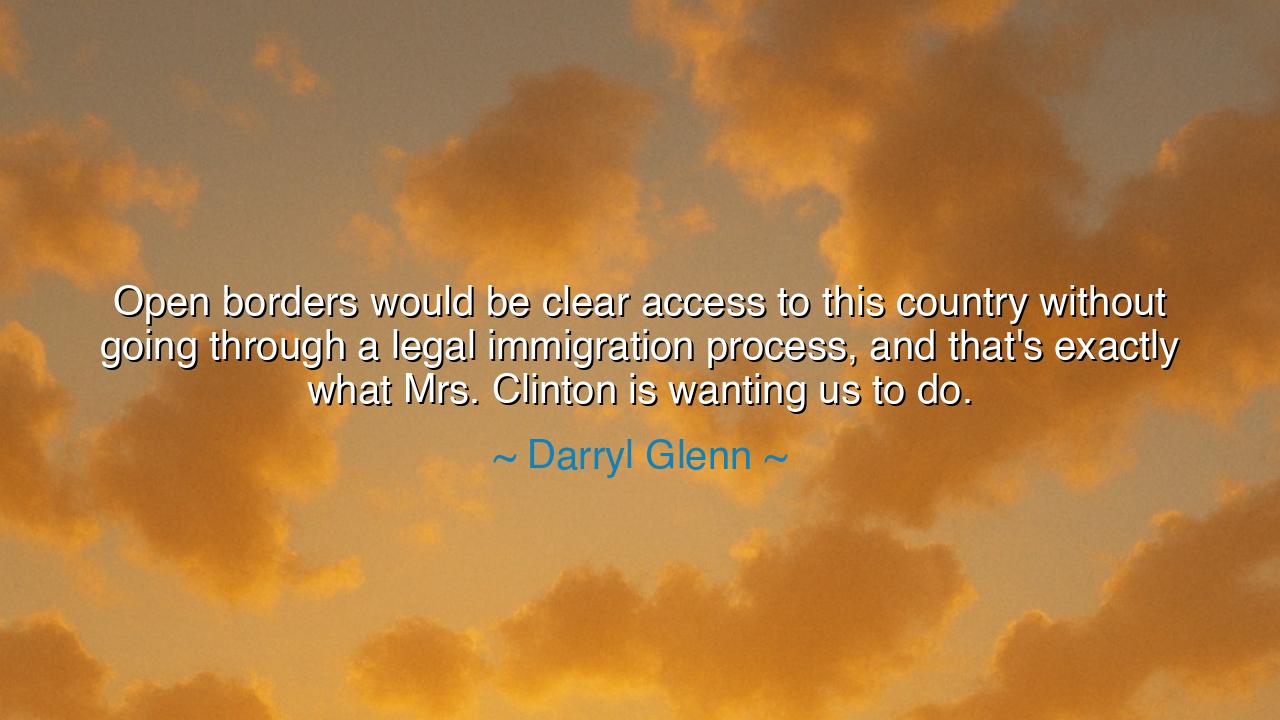
Open borders would be clear access to this country without going
Open borders would be clear access to this country without going through a legal immigration process, and that's exactly what Mrs. Clinton is wanting us to do.





“Open borders would be clear access to this country without going through a legal immigration process, and that’s exactly what Mrs. Clinton is wanting us to do.” Thus spoke Darryl Glenn, a soldier, lawyer, and statesman, during one of the most charged debates in modern American politics. His words are not merely political—they echo an ancient concern of nations and empires alike: the struggle to balance compassion and order, welcome and protection, freedom and law. In this declaration, Glenn warns of a vision he perceives as perilous—a nation without borders, a realm where law gives way to sentiment, and where the very framework of sovereignty dissolves in the name of mercy. His statement stands as both an argument and an invocation: that without structure, even virtue may destroy the very house it seeks to preserve.
Darryl Glenn, a decorated Air Force veteran and conservative voice from Colorado, spoke these words during the heat of the 2016 American presidential campaign, when the nation wrestled with its soul over the question of immigration. His statement arose not from cruelty, but from conviction—a belief that the rule of law is sacred, and that the legal process is the safeguard of civilization. He saw in the idea of “open borders” not freedom, but fragility: the eroding of a system meant to ensure fairness, safety, and sovereignty. To Glenn, the nation was like a great fortress—not closed, but guarded, with gates meant to welcome the deserving and protect the whole. His words, therefore, speak to a universal tension—between the heart that wishes to welcome all, and the mind that knows not all may come at once.
The ancients knew this tension well. In the city-states of Greece and the empires of Rome, borders were not only physical but spiritual. To cross into a land was to enter into its covenant—to share in its duties as well as its privileges. When Rome flung open its gates too freely in its waning days, allowing entire tribes to settle within without structure or assimilation, its unity weakened, and its destiny faltered. Yet when it closed its gates too tightly, it grew arrogant and brittle, losing the dynamism that once made it great. The lesson of history has always been balance—that the law of inclusion must walk hand in hand with the law of preservation. It is this balance that Glenn invokes, though his tone burns with the passion of warning rather than the calm of philosophy.
Consider, too, the story of Ellis Island, the golden gateway through which millions of immigrants entered the United States in centuries past. Those who arrived were not turned away for their foreign birth, but neither were they admitted without record or reason. There was process—inspection, documentation, and the promise of assimilation into the fabric of the nation. It was not cruelty that guided this system, but an understanding: that a nation’s strength lies not in how many it welcomes, but in how well it welcomes—that inclusion must be anchored in order. For a bridge without foundation collapses beneath the weight of its own generosity. Glenn’s words, then, can be read not merely as opposition, but as defense of that ancient wisdom—that law is the architecture of compassion.
Yet there is a deeper current flowing beneath his statement, one that speaks to the fear and yearning of the human spirit. The cry for open borders arises from the compassion that sees suffering across the world and cannot bear to turn away. The cry for secure borders arises from the instinct to protect what one holds dear—the land, the laws, the lineage of sacrifice. Both are born from love, yet love without wisdom becomes chaos, and wisdom without mercy becomes cruelty. Glenn’s warning, though harsh in tone, seeks to preserve this balance. For if a nation loses the discipline of its laws, it risks losing the identity of its soul.
But the wisdom of the ages also reminds us: law must serve humanity, not dominate it. If the legal process becomes so rigid that it denies hope to the oppressed, it too becomes unjust. The challenge, therefore, is not simply to keep borders or open them—it is to govern them with conscience, to design systems that are both fair and compassionate, both structured and humane. For the purpose of law is not exclusion, but harmony—the ordering of human movement so that both host and guest may live in dignity. Glenn’s warning must thus be paired with the reminder that protection is noble only when it guards both justice and mercy.
The lesson, then, is timeless: a nation must be both a home and a haven, but never a fortress of fear or a door without hinges. Let the laws of the land stand firm, yet let the hearts of its people remain open. Let those who seek entry come by the path of truth, and let those who guard the gate act not in anger, but in stewardship. For the strength of a country is measured not only by the walls that defend it, but by the fairness of the hands that open its doors.
So remember, children of this age and those yet to come, the wisdom buried in Darryl Glenn’s fiery words: the call for order must never silence compassion, nor should compassion destroy order. The future of nations lies in the balance between these two forces—law and love, sovereignty and service. Guard your borders, yes—but more importantly, guard your principles, for they are the true frontiers of civilization. And if you would build a nation that endures, let it be one whose walls stand strong—but whose gates, guided by justice, forever open to the light.






AAdministratorAdministrator
Welcome, honored guests. Please leave a comment, we will respond soon